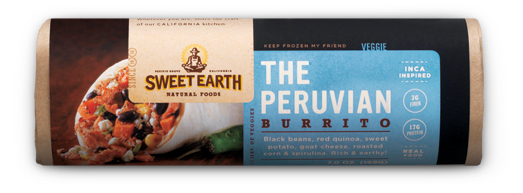Authenticity sells for Sweet Earth
Sweet Earth has a captive consumer audience & scores of interested retailers—but it's easier to build demand than to fulfill it...

Despite their relatively new presence, vegetarian frozen food company Sweet Earth Natural Foods has experienced a surge of success: Not only were they nominated for a 2013 Nexty Award at Natural Products Expo West, but also they garnered Delicious Living magazine’s 2013 Best Bite award for Best Vegetarian Entrée.
What is Sweet Earth doing right? And what can you learn from this intrepid company? Owner and CEO Kelly Swette shares the challenges and successes of developing a natural foods business.
What inspired you to create Sweet Earth?
 I’ve been training all my life for this job. I’ve been a lifelong cook, gardener, and culinary explorer. I love travel, food, and following a healthy lifestyle. I’ve also worked in a lot of different businesses. I started work as a medical engineer, and then I worked at Pepsi-Cola, helping them create, brand, and market new healthier options.
I’ve been training all my life for this job. I’ve been a lifelong cook, gardener, and culinary explorer. I love travel, food, and following a healthy lifestyle. I’ve also worked in a lot of different businesses. I started work as a medical engineer, and then I worked at Pepsi-Cola, helping them create, brand, and market new healthier options.
But I felt that times were changing and food companies weren’t evolving—especially with the amount of information and exposure we have to cuisines of other countries. I believed there was really a niche for more creative, more modern, yet traditionally inspired foods. They needed to be innovative, portable, accessible and based on real food.
There was a small local store available for sale in our area called Sweet Earth Natural Foods. It was founded in 1978, and it was more of a kitchen—they made fresh plant-based soups, sandwiches, and salads. It was still very grounded in the 70s and I felt the recipes could be updated. I wanted to modernize Sweet Earth’s original vegetarian recipes with diverse ingredients. And I wanted these recipes to be portable and accessible to more people. Frozen food was the answer.
You’ve managed to attract young people to your brand. How can entrepreneurs get millennials excited about natural products?
Millennials are all about authenticity. The key to being perceived as authentic is actually being authentic. We mean it when we say we handcraft our products. We’re making them the way you would make them yourself at home.
Millennials are so much more education about global cuisines and spices. They’ve grown up with the Food Network, and they embrace the creativity of food trucks. They’re part of a global society in a way that my generation never had when we were growing up. Sweet Earth celebrates this food knowledge by creating globally inspired flavors.
Young people have a real interest in going back to nature and eating real things that aren’t some reduction of this or that, but are just good and healthy in their own right.
What’s one big challenge you’ve overcome as you’ve grown?
One of the biggest challenges was getting ourselves up and rolling for our first big Expo West show in 2012. It was extremely challenging because we overhauled the logo and all of our packaging.
We also slimmed down the product line. The original Sweet Earth kitchen had an incredible wealth of traditional vegetarian recipes. We had to sift through these recipes and find some kernels of items we believed in and thought we could commercialize for a broader audience. For example, Sweet Earth had a wonderful seitan that they made, but it was packaged like dog food. I thought it had a lot of potential though—we updated the packaging, and highlighted seitan’s juicy and meatlike texture and excellent nutrient profile.
What keeps you going, even during those times when you feel like giving up?
Running this company is so much harder than I expected. What keeps me going is positive feedback from our consumers who say they “live on our burritos,” doctors who call us to say they recommend our products to patients, and media companies giving us recognition.
Both independent natural retailers and larger ones like Whole Foods have been particularly encouraging too. You need that positive reinforcement because it’s difficult for small companies to compete in the marketplace.
What one piece of advice would you give to other natural products entrepreneurs that you wish someone had told you when you were starting out?
It’s important to know that it takes a lot longer than anticipated to enter distribution networks, like Nature’s Best or UNFI. As successful as we were at generating retailer interest at Expo West, we still had to get into the distributors in order to have our product in stores.
We also had a lot of problems with running out of stock. Stores would get us in, and then we ran out of burritos, for instance. Managing the ebb and flow of sales with production is a certainly a challenge.
About the Author(s)
You May Also Like




